People and Culture
POPULATION TRENDS Size of population is an important characteristic of any country. It determines the number of houses, schools, and hospitals; the size of the labor force; and the amount of food and water it is likely to need. The total population of Jamaica in July 2003 was an estimated 2.7 million, with an annual […]
People and Culture
Geography and history formed the crucible from which Chile was born. In the twentieth century, the country survived dictatorships and social upheavals to become a model of democracy in Latin America. Today, the vitality of its people and culture heighten the world's respect for this small nation even more. POPULATION Chile's 15.7 million people are […]
People and Culture
Cuba has the largest population among Caribbean countries, nearly 11.5 million inhabitants. The island's population is highly urbanized, with 76 percent of the people living in cities. With so many people in cities, rural areas are sparsely settled. Like two poles of a magnet, Cuba's population is concentrated on opposite ends of the island. Thirty-eight […]
People and Culture
Nearly 10 million people call the Dominican Republic home. Most of them are of mixed European and African ancestry. Most Dominicans live in cities, although much of the country's rural landscape is densely packed. In this chapter you will learn about the Dominican people. You will get a glimpse of their demographics (demography is the […]
The Original People
Once upon a time, paleontologists believed that human beings and the other primates went their separate ways 15 to 30 million years ago. They based the conclusion on inexact and wide-ranging dating of bits of teeth and skulls scattered throughout the world. Moreover, paleontologists found bits and pieces of big-brained, upright-walking hominids they believed gave […]
The people who know El Nino best
In Spanish, El Nino means 'the male infant” or, when capitalized, the Christ child. Peruvians began applying the term to the ocean and atmosphere more than a century ago. Navy captain Camilo Carrillo noted in 1892 that local sailors referred to a periodic warming of the Pacific, which often occurred around Christmas, as El Nino. […]
Poland: People and Culture
The chapter on the people of Poland and their culture (way of life) serves as the main focus in the review of this modern world nation. To this point, we have covered the physical landscapes and historical geography of Poland. Here, the emphasis is on what people are doing and why, as well as the […]
Irish People and Culture
Fado, fado, Ireland was populated by people from the Eurasian landmass. Racially, the Irish are linked to Western Europe and Scandinavia. The Celtic culture came to envelop Ireland during the years of Celtic domination. Saint Patrick and Christian missionaries brought the Catholic religion to Ireland. Vikings intermarried with the Irish resulting in some genetic changes. […]
Iceland’s People and Their Way of Life
Icelanders enjoy one of the world's highest standards of living and longest life expectancies. As has been mentioned, it is one of the world's most literate societies, with nearly 100 percent of all adults able to read and write. Surveys suggest that it is also one of the most honest countries, with very little crime […]
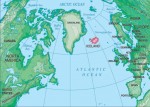
Iceland: A Unique Land and People
By almost any measure, Iceland is one of the world's most unique lands. It is a remote, far northern island country that holds many mysteries and contradictions. Physically, it is a land whose features have been shaped and reshaped by the opposing agents of fire and ice. Its first inhabitants were Irish monks who sought […]
Germany: People and Culture
Given the devastation of two world wars, it might be expected that the population of Germany would be relatively small. In fact, with slightly more than 82 million people, Germany's population is nearly 20 million larger than that of any other European country except Russia. This chapter examines the people of Germany—their demographic makeup, economic […]
Croatia: People and Culture
Who are the Croats? What are they like? How do they live? What do they do? These are just some of the questions that will be answered in this chapter. Croatian People Almost every nation has a legend about its origins, and the Croats are no exception. According to Croat legend, in the distant past […]
Belgium: People and Culture
Few countries are so equally divided by language and other aspects of culture as Belgium. Yet, despite the conflicting interests of the two main population groups, the country has achieved a unity that does not appear to be seriously threatened. Although there have been, and still are, significant separatist and nationalist movements, especially among the […]
People and Culture
These lines, part of a poem written by Emma Lazarus, appear on the Statue of Liberty. They offer a very appropriate introduction to this chapter on the American population. The United States has been and continues to be a grand human experiment conducted on a colossal scale. It has often been called a “country of immigrants,” people who arrived from […]
Zara Ya’iqob
Ruled 1434–1468 Emperor of Ethiopia Zara Ya'Iqob, a powerful and intelligent Ethiopian ruler, was a devout Christian. He sometimes took strong measures to make sure that Christianity remained the dominant religion in ETHIOPIA. The son of emperor Dawit of Ethiopia, Zara Ya'iqob was educated at his father's royal court. When his father died and his brother became emperor, Zara Ya'iqob […]

Witbooi, Hendrik
1830–1905 Nama leader Hendrik Witbooi, chief of the Nama people, was a religious leader who fought against German rule in southern Africa. Trained as a carpenter, he became a deacon, an official of the Christian church. Witbooi was born in Pella, a region south of the Orange River, between the nations of NAMIBIA and SOUTH AFRICA. After nearly dying […]
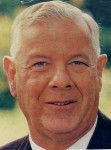
Verwoerd, Hendrik Frensch
1901–1966 South African politician Hendrik Verwoerd created South Africa's policy of racial segregation known as apartheid. As prime minister in the early 1960s, he followed racist policies that deepened the divide between whites and blacks. Born in the Netherlands, Verwoerd moved with his family to SOUTH AFRICA when he was two years old. His father, a grocer, was a […]
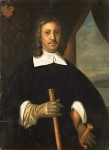
Van Riebeeck, Jan
1619–1677 Dutch colonial administrator Jan Van Riebeeck was a Dutch merchant who founded Cape Colony, the first European settlement in what would later become SOUTH AFRICA. Born in the Netherlands, Van Riebeeck began traveling at an early age with his father, who worked for the Dutch East India Company. In time he, too, worked for the company, and he […]
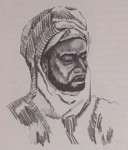
Uthman dan Fodio
1754–1817 Founder of the Sokoto Caliphate Uthman dan Fodio was an Islamic scholar and preacher who founded the Sokoto caliphate in what is now northern NIGERIA. In the 1800s Sokoto became one of the largest independent states in Africa. Born in the town of Gobir, Uthman belonged to a family of Islamic scholars. He grew up speaking Fulfulde, the language […]
Umar ibn Sa’id Tal
ca. 1794–1864 Muslim leader in West Africa A Muslim cleric, or religious leader, Umar ibn Sa'id Tal played an important role in spreading Islam across a broad area of West Africa. Through his writing, military achievements, and his role in the religious brotherhood of the Tijaniyya, he remains a prominent figure for Muslims in West Africa. Born in the […]

Tutuola, Amos
1920–1997 Nigerian writer Nigerian novelist Amos Tutuola gained fame for his retelling of traditional YORUBA myths, legends, and fables. The son of a poor farmer, Tutuola struggled to obtain an education. He gathered and sold firewood to help his father pay for his schooling. When his father died in 1939, however, the family could no longer afford Tutuola's tuition, and […]
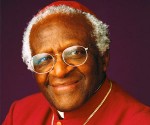
Tutu, Desmond Mpilo
1931– South African religious leader and activist Aleader of the Anglican Church, Desmond Mpilo Tutu is best known for his tireless efforts for peace, unity, and human rights in SOUTH AFRICA. Born in Klerksdorp, he hoped to become a doctor but could not afford medical training. Instead, he became a schoolteacher and attended the University of South Africa. After graduating […]
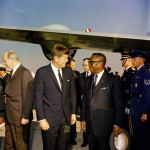
Tubman, William Vacanarat Shadrach
1895–1971 President of Liberia Considered the man who modernized LIBERIA, William Vacanarat Shadrach Tubman served as president of that nation for 27 years. Born in southeastern Liberia, Tubman was a descendant of freed American slaves who had moved to Liberia from Georgia in the 1800s. A member of Liberia's ruling class, he received a college education and became a lawyer […]
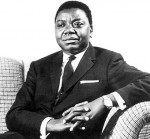
Tshombe, Moise Kapenda
1917–1969 Prime Minister of Democratic Republic of Congo Moise Kapenda Tshombe was one of the first leaders of CONGO (KINSHASA). Born in Katanga province in what was then the colony of Belgian Congo, he was trained as a Methodist preacher and a teacher and later became a merchant. In 1958 he helped found the Confederation of Tribal Associations of Katanga, […]
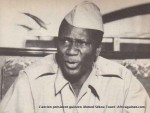
Toure, Sekou
ca. 1922–1984 First president of Guinea Aleader of the INDEPENDENCE MOVEMENT in GUINEA, Sekou Toure became the first president of the newly independent Republic of Guinea in 1958. Born to a modest Muslim family in upper Guinea, Toure had little education. However, he had natural talent as a speaker and leader and he acquired some Islamic learning. After practicing […]
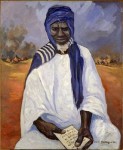
Toure, Samori
ca. 1830–1900 Ruler in Guinea Samori Toure built a state that stretched far across the savannas of what is now the Republic of GUINEA and defended his kingdom for many years against French colonization. Toure was born along the upper Milo River in the highlands of Guinea. The valley of the Milo was an important long-distance trade route that […]
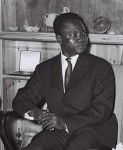
Tombalbaye, Francois-Ngarta
1918–1975 President of Chad The first president of CHAD, Francois-Ngarta Tombalbaye promoted the interests of Christian groups in southern Chad at the expense of Muslims in the north. Born in southern Chad and educated by Protestant missionaries, Tombalbaye became a school teacher. However, his interests eventually turned to politics, and in 1946 he helped create the Chad Progressive Party. He […]
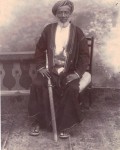
Tippu Tip
ca. 1837–1905 Arab trader and ruler Hamed bin Muhammed el-Murjebi, known as Tippu Tip, was an Arab trader on the CONGO RIVER who established a powerful empire during the late 1800s. Working as an ivory merchant between the east coast and Lake Tanganyika, Tippu Tip gradually built up a military force and gained control of the Upper Congo region. […]
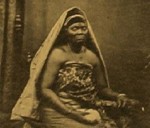
Tinubu, Madame
1805–1887 Nigerian merchant Madame Tinubu was a Nigerian woman who flourished as both a trader and a politician. Her people rewarded her services with the title iyalode, the highest honor a woman could receive, and she has become a legend. Tinubu spent her life in towns on the southwestern Nigerian coast that traded with Europeans. Born in Abeokuta, she […]

Thuku, Harry
1895–1970 Kenyan political leader Harry Thuku led a nationalist group in KENYA that opposed the land and labor policies of the British colonial government. Born into a poor family in northern Kenya, he attended a missionary school. At the age of 16, he traveled to NAIROBI, where he worked as a messenger before being jailed on minor charges. After […]
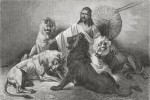
Tewodros
ca. 1820–1868 Emperor of Ethiopia Considered the first modern ruler of ETHIOPIA, Tewodros set out to reunite his country, then a cluster of warring states. Born to noble parents and originally named Kasa, he was educated at Christian monasteries. He became a bandit in the early 1840s, and in 1852 he launched a military campaign against feudal chiefs throughout […]
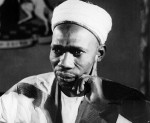
Tafawa Balewa, Abubakar
1912–1966 Prime Minister of Nigeria The first prime minister of NIGERIA, Abubakar Tafawa Balewa helped keep a newly independent Nigeria united in the early 1960s despite serious ethnic and regional differences. A HAUSA born in northern Nigeria, Abubakar became a schoolmaster in 1933 and published a prizewinning novel the next year. However, politics was his true calling. In 1946 Abubakar […]

Susenyos
ca. 1580–ca. 1632 Emperor of Ethiopia One of the most powerful emperors of ETHIOPIA, Susenyos attempted to change the Ethiopian Church. Soon after taking the throne in 1607, Susenyos decided that, for political and religious reasons, Ethiopia should accept the authority of the Catholic Church in Rome rather than the Coptic Church in ALEXANDRIA in Egypt. A Jesuit missionary, Pedro […]
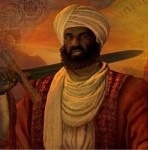
Sunni Ali
1464–1492 Ruler of Songhai Sunni Ali was a member of the Sunni Muslim dynasty that ruled the Songhai Empire of western Africa in the 1300s and 1400s. Known for his immense energy and leadership skills, he expanded the borders of the empire. By the time Sunni Ali came to power, the Songhai kingdom had lost much of its influence […]
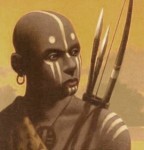
Sundjata Keita
ca. 1205–1255 Founder of the Empire of Mali Abrilliant military leader and skilled administrator, Sundjata Keita founded the empire of MALI, one of the great SUDANIC EMPIRES OF WESTERN AFRICA. Under his rule Mali adopted various laws and customs that are still followed by the people of the region. Born in the west African city of Dakajala, Sundjata was […]
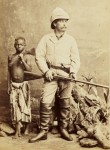
Stanley, Henry Morton
1841–1904 British explorer and author Henry Morton Stanley made several extensive journeys in Africa in the second half of the 1900s. The books he wrote about his adventures were widely read. Stanley was born John Rowlands in Wales, where he grew up in an orphanage. In 1859 he traveled to the United States and changed his name to that […]
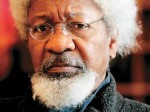
Soyinka, Wole
1934– Nigerian writer Wole Soyinka is a noted Nigerian writer and political activist. He was born in Ijebu-Isara in western NIGERIA, the son of a schoolteacher. After studying at a university in the city of Ibadan, he traveled to England, where he attended the University of Leeds and earned a degree in English literature. In 1957 Soyinka moved to […]
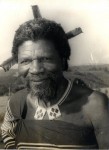
Sobhuza I and II
Kings of Swaziland Sobhuza I (ca. 1780–1839) founded the Swazi kingdom of southwest Africa by uniting various Nguni-speaking clans in southern SWAZILAND. To accomplish this, he used techniques of persuasion that included arranging alliances through marriage and granting titles and choice lands to neighboring chiefs. Sobhuza then moved his people into central Swaziland, defeating rival clans and expanding his holdings […]
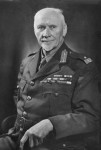
Smuts, Jan Christiaan
1870–1950 Prime Minister of South Africa Jan Christiaan Smuts spent most of his life trying to unify SOUTH AFRICA, first as a soldier and later as a politician. The son of Afrikaners, South Africans of Dutch ancestry, Smuts lived in Cape Colony before studying law at Cambridge University. After returning to South Africa, he fought on the side of the […]
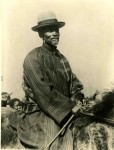
Shembe, Isaiah
1870–1935 South African church leader Isaiah Shembe was a ZULU prophet who founded his own church in the early 1900s. As a young man Shembe experienced a dramatic conversion that led him to give up worldly things and become a wandering preacher and healer. He joined the African Baptist Church in 1906 and eventually became an ordained minister. However, […]
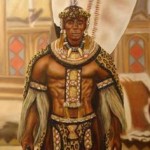
Shaka Zulu
ca. 1790–1828 Ruler of the Zulu Shaka Zulu founded the Zulu kingdom, which once controlled sections of present-day South Africa. In 1816 Shaka succeeded his father as ruler of the Zulu, a small ethnic group in southern Africa. Shaka soon expanded his chiefdom. He created a fierce army, providing his troops with long-bladed spears that were ideal for stabbing […]
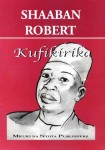
Shaaban Robert
1909–1962 Tanzanian poet and writer Sheikh Shaaban Robert is regarded as one of the greatest poets and writers in the SWAHILI language. He developed a new style of Swahili writing that combined traditional storytelling with the techniques of modern poems and novels. He also introduced the essay into Swahili literature. Born near the port city of Tanga in Tanganyika […]
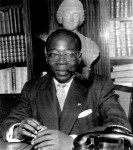
Senghor, Leopold Sedar
1906–2001 President of Senegal Leopold Sedar Senghor was both a successful poet and a major political figure. Born in French West Africa (now SENEGAL), Senghor studied to become a Catholic priest. However, he was forced to leave the seminary because he protested against racism. In 1928 he traveled to France to study. He hoped to become recognized as a […]
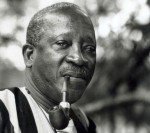
Sembene, Ousmane
1923–2007 Senegalese author and film director Ousmane Sembene is widely regarded as the father of African CINEMA. Born in SENEGAL, Sembene served in the French army during World War II. He returned to his homeland briefly and took part in a railway strike in 1947–1948. He went back to France and, over the next several years, traveled to Denmark, Russia, […]

Schreiner, Olive
1855–1920 South African writer Olive Schreiner wrote various works of social criticism and fiction, including South Africa's first important novel, The Story of an African Farm (1883). Her books combine vivid descriptions of life in South Africa, criticism of British colonialism, and support for women's rights and racial equality. Schreiner was born in Wittebergen, SOUTH AFRICA, where her German father […]
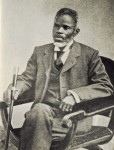
Sarbah, John Mensah
1864–1910 Ghanaian politician John Mensah Sarbah was the leading African politician in the Gold Coast (modern-day GHANA) in the late 1800s and early 1900s. Born into a wealthy family, Sarbah went to England to study law. At the age of 23, he returned to the Gold Coast to set up a legal practice. He became known for defending the […]
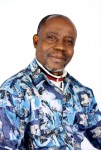
Samba, Cheri
1956– Congolese painter Cheri Samba is one of the first modern African painters to receiveinternational recognition for his work. His paintings explore how relations between Africans and Europeans have influenced the way Africans view themselves. Samba has described himself as an explorer of modern Africa and the West. According to some art critics, the main subject of his paintings […]

Sa’id ibn Sultan
1791–1856 Sultan of Zanzibar Sa'id ibn Sultan reigned as sultan of Oman and Muscat in the Middle East for some 50 years. During this time he extended his sultanate from Arabia to the east coast of Africa, establishing one of the great trading empires in the region. Sa'id was the son of the lord of Muscat, who was […]
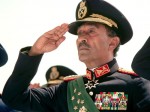
Sadat, Anwar
1918–1981 Egyptian president The presidency of Anwar al-Sadat was shaped largely by the way he conducted Egypt's relationship with Israel. Sadat won the admiration of Arabs for his war against Israel and then earned international praise for making peace with Israel. Born in an Egyptian village, Sadat attended school in CAIRO and then joined the army. Dedicated to the […]
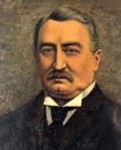
Rhodes, Cecil John
1853–1902 British colonial leader Cecil John Rhodes rose to a position of great wealth and power in Britain's Cape Colony in southern Africa. He developed the region's diamond mines and was responsible for British expansion northward into the land that is now ZAMBIA and ZIMBABWE. The son of a clergyman in Bishop's Stortford, England, Rhodes left home at 17 to […]
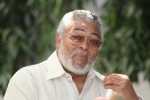
Rawlings, Jerry
1947– President of Ghana Jerry Rawlings, an air force officer, ruled the nation of Ghana from 1981 to 2000. Originally named Jerry Rawlings John, he was the child of a Ghanaian mother and a Scottish father. After attending the respected Achimota Secondary School, he joined the Ghanaian air force in 1967. During his years as a fighter pilot, he […]
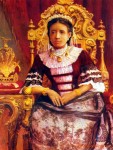
Ranavalona, Mada
1788–1861 Queen of Madagascar Mada Ranavalona was the wife of MADAGASCAR's King RADAMA I, who unified most of the island under the rule of the Merina clan. When Radama died in 1828 without naming an heir, Ranavalona assumed power. She secured her position by negotiating with Merina nobles and military leaders, and by executing all potential rivals. A fierce […]

Radama I
ca. 1793–1828 King of Merina Radama I became king of the Merina kingdom in MADAGASCAR in 1810. He succeeded his father, who had founded the kingdom. In 1816 Radama negotiated an agreement with the British government that provided military and administrative support to Merina. Radama went on to conquer most of Madagascar. Under the terms of the agreement, the […]
Quaque, Philip
1741–1816 Ghanaian missionary and educator Philip Quaque was a missionary, an educator, and the first African to become a priest in the Church of England. Although he failed in his efforts to spread Christianity and education in the Gold Coast (present-day Ghana), his writings are a valuable source of information about the struggle for control of western Africa in the […]
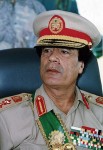
Qaddafi, Muammar al-
1942–2011 Libyan military and political leader Muammar al-Qaddafi (also spelled Khadafy or Gadhafi) has been the head of the government of LIBYA since 1969. He was born in northern Libya into a family of Bedouin, nomadic desert-dwelling Arabs. After attending a local Muslim school, he entered the Libyan Military Academy and began rising through the ranks of the Libyan army. Qaddafi […]
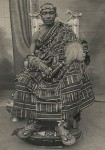
Prempeh, Agyeman
ca. 1871–1931 Asante king Agyeman Prempeh was king of the ASANTE (Ashanti), a people who once controlled much of present-day GHANA and IVORY COAST. Prempeh took power in 1888 after defeating rivals for the Asante throne. As king of a confederacy of Asante chiefdoms, he tried to unite his people by ending fighting in the central region and conquering rebels […]
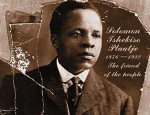
Plaatje, Sol
1876–1923 South African writer An accomplished writer and a founder of the African National Congress, Sol Plaatje worked for political and cultural causes in SOUTH AFRICA. He was born in Boshof in what was then the Orange Free State of South Africa, one of the AFRIKANER REPUBLICS founded by Dutch colonists. He spoke the Setswana (or Tswana) language and […]

Pereira, Aristides Maria
1924–2011 President of Cape Verde Aristides Maria Pereira helped transform CAPE VERDE from an island colony into a modern nation. He fought for independence and then, as president, guided the new country through its first 15 years. Pereira was born in Boa Vista in the Cape Verde Islands off the coast of West Africa. The islands were then a […]
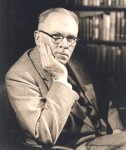
Paton, Alan
1903–1988 South African writer Alan Paton was a white South African novelist and a dedicated political activist. Through his writing and his political efforts, he protested against racial injustice and apartheid. Born and educated in Pietermaritzburg in the Natal province of South Africa, Paton worked as a schoolteacher. Then he served as the head of a reform school for […]
Osei Tutu
ca. 1636–1717 Asante king Osei Tutu, the first king of the ASANTE people of western Africa, united the people in campaigns of military conquest and expansion. In about 1685 Osei Tutu succeeded his uncle as ruler of Kumasi, one of many Asante states. He continued the wars of expansion that his uncle had begun and brought the various Asante […]

Olympio, Sylvanus Epiphanio
1902–1963 President of Togo The first president of TOGO, Sylvanus Olympio was also the first leader of an independent African country to be overthrown by a military coup. Olympio was born into a wealthy family and studied in Europe before embarking on a career with a multinational company operating in Togo. He rose high in the company but was […]
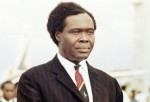
Obote, Milton
1924–2005 President of Uganda Milton Obote sought to end British colonial rule in East Africa and twice served as president of UGANDA. Expelled from Makerere University in Uganda for political activity, he moved to KENYA where he joined a number of African political groups. When he returned to Uganda several years later, he was elected to the newly formed Legislative […]

Nyerere, Julius Kambarage
1922–1999 President of Tanzania Julius Nyerere led the fight to end British rule in Tanganyika (now TANZANIA) and served as the country's president from 1962 to 1979. He also played a key role in Africa's struggle for freedom and social justice, and African independence movements found refuge in his country. The son of a chief, Nyerere was educated in […]

Nwapa, Flora
1931–1993 Nigerian writer One of Africa's leading female authors, Flora Nwapa used her work to promote the role of women in society. She was the first black African woman to have a novel published, and she founded Tana Press in 1977 to bring the works of African women to the public. Born at Oguta in eastern Nigeria, Nwapa […]
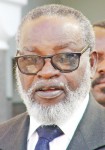
Nujoma, Samuel Shafiishuna
1929– President of Namibia Sam Nujoma was a political organizer in colonial NAMIBIA (then known as South West Africa), who became the country's first president. As a young man, Nujoma worked for the railway but was fired from his job for attempting to organize a union. In 1958 he founded and became president of the Ovamboland People's Organization. His […]

Nongqawuse
ca. 1840–ca. 1900 Xhosa prophet Nongqawuse was a young woman whom the XHOSA people of SOUTH AFRICA regarded as a prophet who communicated with the spirit world. She urged them to kill their cattle—advice that proved tragic for her people and their kingdom. An orphan, Nongqawuse was raised by her uncle, a Christian convert, in South Africa's Transkei region. […]

Nkrumah, Kwame
1909–1972 President of Ghana Francis Nwia Kofi Nkrumah, known as Kwame Nkrumah, was the prime minister and first president of GHANA. Born in the Gold Coast (present-day Ghana), Nkrumah attended Achimota College in the colony. He continued his studies in the United States, where he served as president of the African Students Association, and in England. In London he wrote […]

Ngugi wa Thiong’o
1938– Kenyan author Writer Ngugi wa Thiong'o is known not only for his literary work but also for his political protests and his commitment to writing in African rather than European languages. Born into a peasant family of the GIKUYU people near NAIROBI, KENYA, Ngugi received an education at a colonial high school. He began to write while attending […]

Neto, Augustinho
1922–1979 President of Angola Augustinho Neto was a leader in the fight against colonial rule in ANGOLA and the country's first president after independence. The son of a pastor, Neto went to Portugal to study medicine in 1947 but soon became involved in the Angolan independence movement and was also involved in communist activities. After returning to Angola in 1958, […]
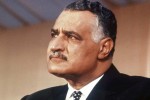
Nasser, Gamal Abdel
1918–1970 President of Egypt President of EGYPT from 1956 to 1970, Gamal Abdel Nasser was a leading figure in the Arab world. The son of a postal clerk, Nasser attended primary school in a small village in the Nile Delta. He moved to his uncle's home in Cairo, where he received his secondary education and then attended law school […]
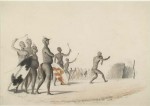
Mzilikazi
ca. 1790–1868 Founder of Ndebele kingdom For a short time in the early 1800s, Mzilikazi served as a lieutenant in the army of the Zulu ruler SHAKA ZULU. After one battle, Mzilikazi kept the cattle he captured instead of sending them to Shaka. When the chief sent men to investigate, Mzilikazi insulted Shaka by cutting the feathers off their […]

Mvemba Nzinga
ca. 1465–1543 Ruler of kingdom of Kongo Mvemba Nzinga, son of the ruler of the kingdom of Kongo, was baptized as a Christian in 1491 and took the name Afonso I. When his father died in 1506, Mvemba Nzinga became king, claiming that he had divine help in gaining the throne. He increased his power by selling ivory, copper, […]
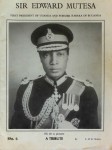
Mutesa II, Frederick
1924–1969 Ruler of Buganda Frederick Mutesa II, known as “King Freddie” by Westerners, was ruler of the East African state of Buganda from 1939 to 1953. Buganda enjoyed special treatment within the British colony of UGANDA until 1953. When the British decided to end Buganda's special status, Mutesa demanded independence for his kingdom. When he also refused to pass along […]

Museveni, Yoeri
1944– President of Uganda Yoweri Museveni, a former political activist, became president of UGANDA in 1986. Under his leadership, Uganda has achieved considerable political stability and economic growth. As a youth Museveni organized a movement to prevent pastoralists from being forced off their lands. He attended the University of Dar es Salaam in TANZANIA, where he led a student group […]
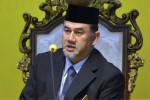
Muhammad V
1909–1961 King of Morocco King Muhammad V was the first ruler of MOROCCO after the country gained its independence from France in 1956. Born Sidi Muhammad, the future king was the son of Sultan Moulay Yusuf. When Yusuf died in 1927, the French colonial authorities named the 18-yearold Muhammad as the new sultan. The French hoped to control the young […]

Mugabe, Robert
1924– President of Zimbabwe Robert Mugabe has been the leader of ZIMBABWE since the country achieved independence in 1980. Born and educated in a Catholic mission in the British colony of Southern Rhodesia, Mugabe became a teacher. In 1956 he moved to the newly independent nation of GHANA. Several years later, he returned to his home country and entered […]
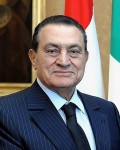
Mubarak, Hosni
1928–2011 President of Egypt Hosni Mubarak became president of EGYPT in 1981 after the assassination of Anwar SADAT. Reelected several times, Mubarak has steered Egypt through a difficult period marked by growing unrest, guerrilla violence, and threats from Islamic political groups. Born in the Nile River delta to a peasant family, Mubarak graduated from the Cairo Military Academy […]
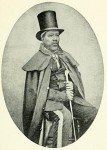
Moshoeshoe I
1786–1870 Founder and king of Basutoland Founder and king of the Basotho nation (present-day LESOTHO), Moshoeshoe I was noted for his military skill and diplomatic abilities. He played a major role in protecting Lesotho from conquest by European settlers, and he helped the country achieve independence. Originally named Lepoqo, Moshoeshoe was the son of a Koena chief. While a young […]
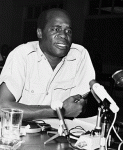
Mondlane, Eduardo Chivambo
1920–1969 Mozambican anticolonial leader Eduardo Mondlane established the freedom movement known as FRELIMO that eventually won MOZAMBIQUE's independence from Portugal. Educated in South Africa, Portugal, and the United States, Mondlane became heavily involved with the movement for Mozambican independence. He concluded that Portugal's inflexible attitude probably meant that war was inevitable for Mozambique. However, he was determined to avoid devastating the country […]

Moi, Daniel arap
1924– President of Kenya In 1978 Daniel Toroitich arap Moi succeeded Jomo KENYATTA as president of KENYA. Moi has managed to remain in power since then, despite a growing opposition and accusations of corruption. A member of the Kalenjin people, an ethnic minority in Kenya, Moi worked as a teacher as a young man. In 1955 he was one […]
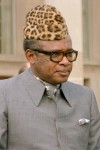
Mobutu Sese Seko
1930–1997 President of Zaire President of Zaire—now known as CONGO (KINSHASA)—from 1965 to 1997, Mobutu Sese Seko ruled as a dictator. His regime gained a reputation for corruption and mismanagement. Despite Zaire's rich natural resources, the nation suffered a serious economic decline under Mobutu's rule. Born Joseph Desire Mobutu in the Belgian colony of Congo, Mobutu was educated in missionary […]
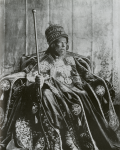
Menilek II
1844–1913 Emperor of Ethiopia Menilek II was the son of the heir to the kingdom of Shewa in what is now central ETHIOPIA. In 1856 TEWODROS II used modern weapons to conquer Shewa and many other parts of Ethiopia. Menilek was captured and taken to Tewodros's court, where he was raised and educated. Nine years later, he escaped and […]
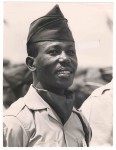
Mengistu Haile Mariam
ca. 1942– President of Ethiopia Mengistu Haile Mariam led a military coup that removed Ethiopia's emperor HAILE SELASSIE I from power in 1974. As head of state, Mengistu hoped to modernize Ethiopian society and unify the country by lessening ethnic rivalries. Mengistu's military career began when he joined the Ethiopian army at the age of 14. After attending officer […]
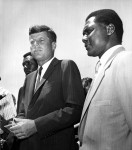
Mboya, Tom
1930–1969 Kenyan labor and political leader Tom Mboya was a labor leader who played a key role in the early government of KENYA after independence. At age 22 he founded a government workers' union and later became general secretary of the Kenya Federation of Labor. At the time, labor organizations had considerable power in Kenya (then a British colony) because […]

Maranke, John
1912–1963 African religious leader John Maranke was the founder of a successful independent church called the Apostolic Church of John Maranke. Today the church claims over 500,000 members in Africa, and many European converts outside the continent. Maranke was born Muchabaya Ngomberume in Southern Rhodesia (now Zimbabwe). His mother was the daughter of the Shona chief Maranke, whose clan name […]
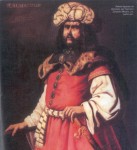
Mansur, al-
1549–1603 Ruler of Morocco Mulai al-Mansur was the sixth, and perhaps greatest, ruler of the Sa'di dynasty of MOROCCO. During his reign (1578–1603) Morocco enjoyed a long period of peace and prosperity, highlighted by its conquest of the ancient city of TIMBUKTU, now part of present-day MALI. A master of diplomacy, al-Mansur managed to balance relations with many competing foreign […]

Mansa Musa
Early 1300s Emperor of Mali Mansa Musa was the most famous ruler of the ancient West African empire of MALI. During his reign the Mali empire reached its greatest size, extending hundreds of miles from north to south and from east to west. However, Mansa Musa is best remembered for his pilgrimage to Mecca, the holy city of Islam, […]

Mandela, Nelson
1918–2013 President of South Africa Nelson Mandela is one of the best-known and most influential political leaders in Africa. Imprisoned for many years because of his activities against apartheid, he later became the first black president of SOUTH AFRICA. For many South Africans, Mandela symbolized the hope for black equality. Born in the Transkei region of South Africa, Mandela […]
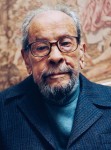
Mahfouz, Naguib
1911–2006 Egyptian writer Author of 40 novels and short story collections and more than 30 screenplays, Naguib Mahfouz received the Nobel Prize for literature in 1988. He was the first Arabic author to win that honor, which brought attention to his work and to modern Arabic fiction in general. During most of his writing career, Mahfouz also worked in […]

Maherero, Samuel
ca. 1854–1923 Chief of the Herero Samuel Maherero became chief of the HERERO people of NAMIBIA after the death of his father in 1890. Baptized and schooled by German missionaries, Maherero cooperated with German colonists who arrived in Namibia about this time. By selling land to the Germans, he obtained their support in overthrowing and conquering rival Herero chiefs. In […]
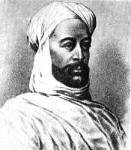
Mahdi, al-
ca. 1840–1885 Sudanese religious leader Al-Mahdi, the founder of an Islamic religious movement, seized control of SUDAN and established an empire that lasted for nearly 20 years. Born Muhammed Ahmad ibn Sayyid Abdullah, he began religious studies at an early age and joined a religious order in the capital city of KHARTOUM. He eventually left the order and moved […]
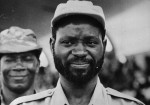
Machel, Samora Moises
1933–1986 President of Mozambique Samora Machel was a leader of the independence struggle in MOZAMBIQUE who became the country's first president in 1975. He became politically active as a young man, joining the movement known as FRELIMO that was dedicated to Mozambique's independence. He volunteered for FRELIMO military training in ALGERIA and was later sent to Mozambique to participate in […]
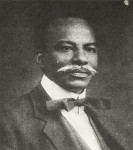
Macaulay, Herbert Samuel Heelas
1864–1946 Nigerian political leader Considered the founder of Nigerian nationalism, Herbert Samuel Heelas Macaulay promoted self-government in NIGERIA in the early 1900s. Born into an educated, Christian Nigerian family, Macaulay attended school in Lagos. In 1890 he won a scholarship from Nigeria's British colonial government to study abroad. After earning a degree in civil engineering in England, he returned to […]
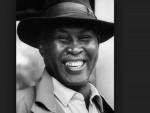
Lutuli, Albert
1898–1967 South African political leader Albert Lutuli was president of the African National Congress (ANC), a black-led political party in SOUTH AFRICA that fought for African rights. In 1960 he won the Nobel Peace Prize for his leadership in the nonviolent struggle against racism. The son of a preacher, Albert John Mavumbi Lutuli was born in Southern Rhodesia (present-day […]
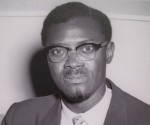
Lumumba, Patrice Emery
1925–1961 Congolese political leader Patrice Emery Lumumba was the first prime minister of Zaire, the country now called CONGO (KINSHASA). Known for his fervent nationalism and his commitment to freeing Africa from colonial rule, Lumumba played a leading role in gaining independence for his country. Born in the Kasai province of the Belgian Congo, Lumumba received a basic education at […]
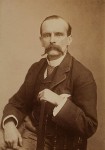
Lugard, Frederick John Dealtry
1858–1945 British colonial administrator Frederick John Dealtry Lugard played an important role in British colonial Africa. Lugard worked to end African slavery and slave trading. He also created the system of “indirect rule,” which gave traditional African authorities considerable control over their local affairs. Born in India of missionary parents, Lugard attended school in England and began a career in […]
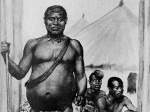
Lobengula
ca. 1836–1894 King of Matabeleland Lobengula was the last ruler of the NDEBELE kingdom of Matabeleland in present-day ZIMBABWE. After the death of his father, MZILIKAZI, the founder of the kingdom, civil war broke out. Lobengula eventually won the war, and he took the throne in 1870. However, the kingdom remained in chaos. Lobengula spent much of his reign […]
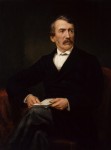
Livingstone, David
1813–1873 British missionary and explorer David Livingstone went to Africa as a missionary in the mid-1800s and became one of the continent's leading explorers and geographers. He also played a key role in the movement to end the SLAVE TRADE. Born in Blantyre, Scotland, Livingstone began work in a cotton mill at the age of ten. Determined to become a […]
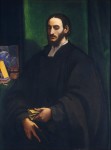
Leo Africanus
ca. 1485–ca. 1554 Arab geographer Leo Africanus was an Arab geographer who make numerous journeysin the northern and western regions Africa and wrote a bookabout the places he visited. Born in Spain and educated in MOROCCO, hetraveled extensively throughout North Africa and made three trips to EGYPT. South of the Sahara, he visited Gao and […]
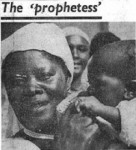
Lenshina, Alice
1920–1978 Zambian religious leader and prophet Alice Lenshina was the founder of a PROPHETIC MOVEMENT that gathered tens of thousands of followers. In the 1960s she led an uprising against the colonial government in ZAMBIA. Lenshina was born in northern Zambia among the Bemba people. As a young woman, she was preparing to join the Presbyterian Church at the mission center […]